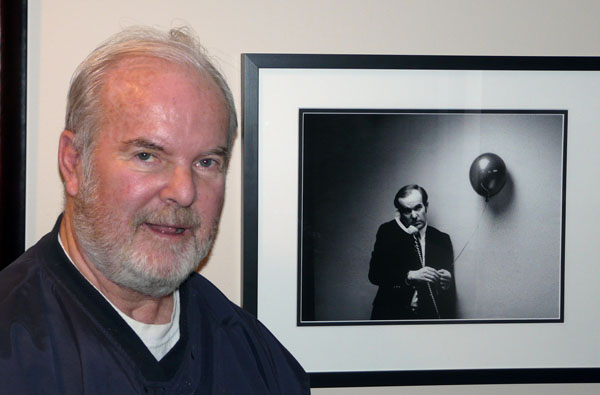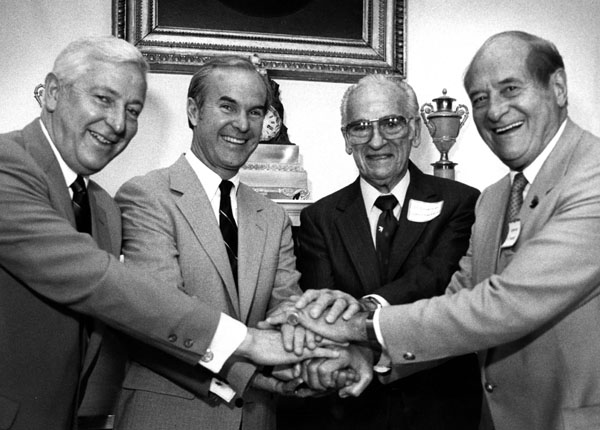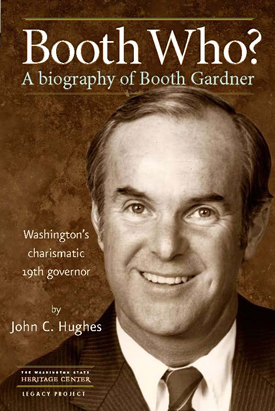Remembering Booth Gardner: ‘Civility & public service’
(Left to right: former Gov. John Spellman, former Gov. Booth Gardner, former Lt. Gov. John Cherberg, former Gov. Al Rosellini. Photo courtesy of Washington State Archives.)
Booth Gardner, Washington’s 19th governor who later led a successful statewide initiative to legalize assisted suicide for the terminally ill, died at his Tacoma home Friday night at age 76 from complications of Parkinson’s disease.
Gardner became one of Washington’s more popular and charismatic governors. Gardner, a Democrat, was elected as the state’s top executive in 1984, defeating Republican incumbent John Spellman. Gardner was easily reelected in 1988 and chose not to run in 1992. He later was appointed by President Clinton as a U.S. trade ambassador in Geneva. During his stint as trade ambassador, he was diagnosed with Parkinson’s.
Gardner was elected to the State Senate in 1970. In 1981, he was elected Pierce County Executive.
Secretary of State Kim Wyman commented on Gardner’s passing and his career in public service:
While I did not have the honor of working with Governor Gardner during his time in Olympia, I have always been aware of his impact on those who worked for him. Booth Gardner understood the importance of civic engagement and public service. His leadership was grounded in civility. As a result, he inspired a generation of Democrats to serve and run for public office in the same way that Dan Evans inspired a generation of Republicans. Many staff members and elected officials at the local, state, and national level learned the value of working with people on both sides of the political aisle to make good policy decisions from their time with Governor Gardner.
Civility and public service sum up Booth Gardner’s legacy in Washington State.
John C. Hughes, chief historian for the Secretary of State’s Legacy Project, wrote a 2010 biography about Gardner called “Booth Who?” He reminisced about his time interviewing the former governor for the book:
“Booth Gardner was one of the most fascinatingly complex, bright and caring people I have ever known. Our interviews began right after two deep brain surgeries that largely restored his cognitive facilities and remarkable stories just came pouring out. He was so relieved to be able to express himself. For someone as ebullient as Booth, having a sluggish brain was torture. Within six months, sadly, inexorably, he was back in decline. It was a vivid example of the importance of capturing oral histories as the building blocks of important biographies.”
Hughes’ biography on Gardner is available for purchase for $25 plus shipping and handling costs on the Secretary of State Online Store. The oral history also is available, free, online.
The Legacy Project, which produces books and oral histories on influential Washingtonians, provides this insight on Gardner’s ancestry:
“The Booth Gardner story has deep roots. Digging into the State Library’s trove of genealogical records and unpublished manuscripts, Hughes discovered that Gardner is the descendant of Oregon Trail pioneers. A sixth-generation Northwesterner, Gardner has illustrious ancestors who came to what was then the Oregon Country a half century before Washington statehood in 1889. His great-grandfather was elected King County auditor in 1874, and his grandfather helped save the King County Courthouse in the great Seattle fire of 1889. Booth’s great-uncle was once part-owner of the Seattle Post-Intelligencer.”
Many elected officials and former staffers under Gardner remembered the former two-term governor, including U.S. Senators Patty Murray and Maria Cantwell, Governor Jay Inslee, former Governor Chris Gregoire, who was appointed as Department of Ecology director by Gardner in 1988, and 10th District U.S. Rep. Denny Heck, who served as chief of staff during Gardner’s second term as governor.

(Photo courtesy of John C. Hughes)
Gardner is survived by his son, Doug, daughter, Gail, and eight grandchildren.

